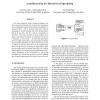Free Online Productivity Tools
i2Speak
i2Symbol
i2OCR
iTex2Img
iWeb2Print
iWeb2Shot
i2Type
iPdf2Split
iPdf2Merge
i2Bopomofo
i2Arabic
i2Style
i2Image
i2PDF
iLatex2Rtf
Sci2ools
112
click to vote
ICPADS
2007
IEEE
2007
IEEE
Loop recreation for thread-level speculation
For some sequential loops, existing techniques that form speculative threads only at their loop boundaries do not adequately expose the speculative parallelism inherent in them. This is because some inter-iteration dependences, which translate into inter-thread dependences at run time, are too costly to synchronize or speculate. This paper presents a novel compiler technique, called loop recreation, to transform a loop into a prologue, a kernel loop — formed with instructions from two adjacent iterations, and an epilogue so that the inter-iteration dependences in the kernel are less costly to enforce at run time than those in the original loop. We prove the concept by giving an algorithm for finding an optimal loop recreation with respect to a simple misspeculation cost model and by demonstrating performance advantages of loop recreation over two recent techniques for speculative multi-core systems running four irregular applications with indirect array accesses.
Related Content
| Added | 03 Jun 2010 |
| Updated | 03 Jun 2010 |
| Type | Conference |
| Year | 2007 |
| Where | ICPADS |
| Authors | Lin Gao 0002, Lian Li 0002, Jingling Xue, Tin-Fook Ngai |
Comments (0)

